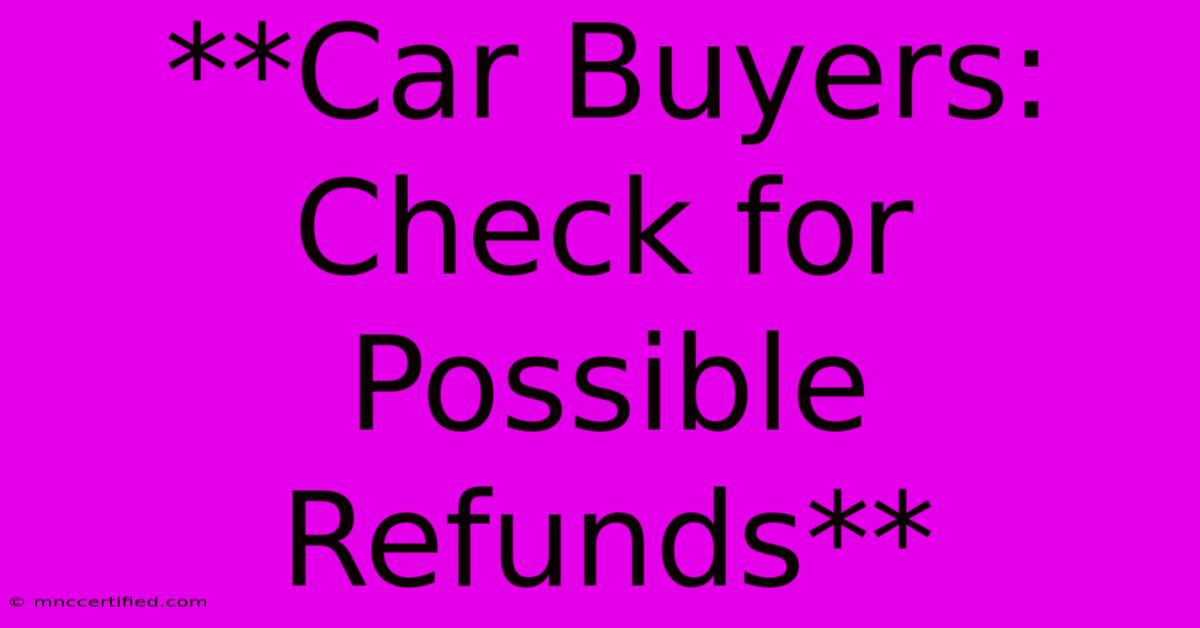**Car Buyers: Check For Possible Refunds**

Table of Contents
Car Buyers: Check for Possible Refunds - Did You Get Your Money Back?
Buying a car is a significant investment, and ensuring you're getting the best deal possible is crucial. While most car buyers focus on the price and financing, many are unaware of potential refunds they might be eligible for. This article will guide you through various scenarios where you could be owed money after purchasing a car.
Common Refund Scenarios
1. Unnecessary Add-ons: Many dealerships try to upsell customers with unnecessary add-ons like extended warranties, paint protection, or fabric treatments. Often, these services are overpriced and not truly needed. If you feel pressured into purchasing these extras, you may be able to request a refund.
2. Misrepresented Information: If the dealership provides inaccurate information about the car's features, mileage, or history, you might be entitled to a refund or a price adjustment. For example, a dealer might claim a car has a certain number of miles when it actually has more.
3. Financing Issues: Mistakes can occur during the financing process, leading to incorrect interest rates, loan terms, or hidden fees. If you discover errors in your financing agreement, you have the right to seek a refund or renegotiate the terms.
4. Lemon Laws: If your new car experiences persistent problems that the dealer cannot fix, you might be eligible for a full refund under lemon laws. These laws vary from state to state, so it's crucial to research your local laws.
5. Unforeseen Circumstances: Sometimes, unforeseen circumstances can arise after a purchase. For instance, if you lose your job or face a medical emergency, you may have grounds to request a refund.
How to Request a Refund
- Document everything: Keep copies of all relevant paperwork, including the sales contract, financing documents, and communication with the dealership.
- Contact the dealership: Start by politely requesting a refund, outlining your reason for doing so. Clearly explain why you believe you are entitled to a refund.
- File a complaint: If the dealership refuses your request, you can file a complaint with your state's attorney general or consumer protection agency.
- Consider legal action: If all else fails, you may need to hire an attorney to pursue legal action against the dealership.
Tips for Avoiding Refunds in the Future:
- Thoroughly research: Before making a purchase, thoroughly research the car and the dealership's reputation.
- Read the fine print: Carefully review all documents before signing, especially the sales contract and financing agreements.
- Negotiate: Don't be afraid to negotiate the price and avoid any unnecessary add-ons.
- Get everything in writing: Make sure all agreements are documented in writing, including any promises or guarantees from the dealership.
Conclusion
While buying a car should be an exciting experience, it's essential to be aware of your rights and potential avenues for refund. By understanding the common refund scenarios and following our tips, you can ensure you receive a fair deal and avoid unnecessary headaches down the road. Remember, knowledge is power when it comes to buying a car.

Thank you for visiting our website wich cover about **Car Buyers: Check For Possible Refunds**. We hope the information provided has been useful to you. Feel free to contact us if you have any questions or need further assistance. See you next time and dont miss to bookmark.
Featured Posts
-
Giannis Historic Night In Bucks Victory
Nov 13, 2024
-
Facility Explosion In Louisville Injures 11
Nov 13, 2024
-
Michigan State Falls To Kansas Game Recap
Nov 13, 2024
-
Steph Curry Says Night Night To Mavericks In Warriors Win
Nov 13, 2024
-
Overtime Drama Pistons Beat Heat
Nov 13, 2024